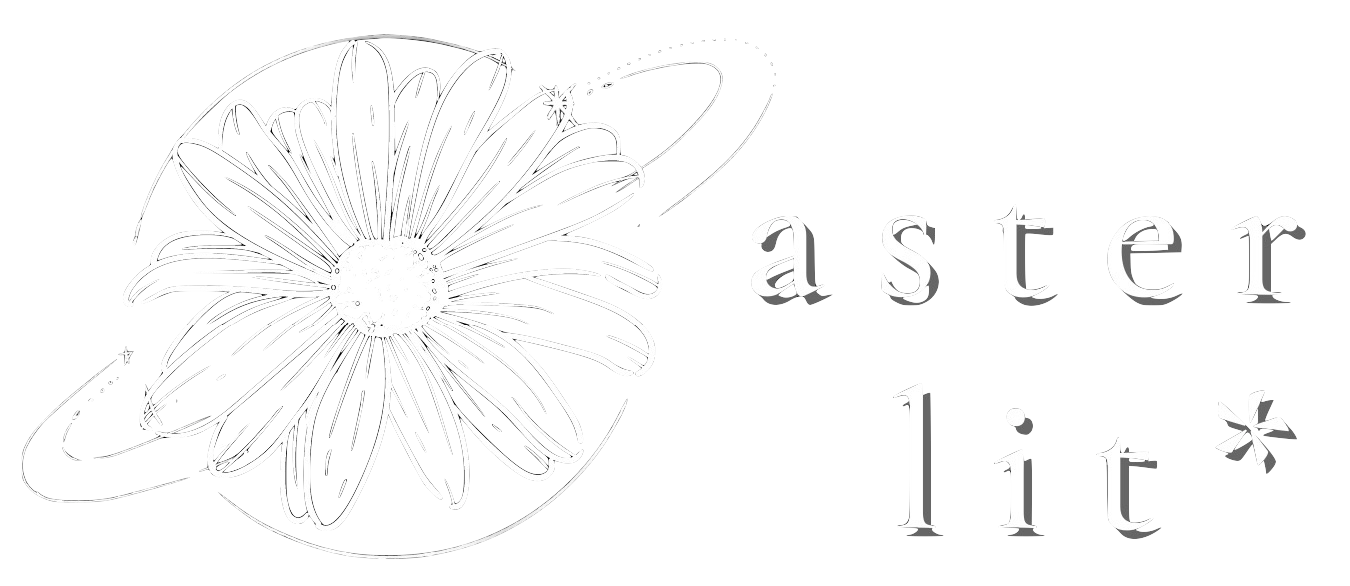
Aster Lit: Et Cetera
Issue 11—Spring 2024
footnotes
Ritika Dasgupta, India
The crickets are chirping. The soft summer rain perfumes the night air and wafts in through the open window, where a girl reads past the hour she’s allowed to stay up at. The nights are cool and the mornings hot, like the city can’t decide what season it wants to be in. Rain drips down the facades of the houses, turning the sunburned light red to a dark rust.
Calcutta whispers stories heard by no one in the rain. It’s a ghost city in the twilight, white skinned generals and coolies rubbing shoulders on empty train platforms, taboos forgotten in the spectre world.
The girl wanders down book lined streets on summer vacation. Hides behind the counter of her uncle’s book shop. Her view is of her uncle’s kurta clad knees as he attends to customers over the counter, hidden away in her little corner, her safe space carved out from the world. She revels in being lost between the shelves in the back. The books watch as another story wanders between them. The story of someone lost, someone afraid. Afraid to take up space. Traces left behind in the spilled coffee on tables, in the bottles of sherbet from Paramount that she stockpiles like jewels in her parent’s fridge.
Weak afternoon sunlight turns the facades of the houses gold. The houses are silent, the city drowsing in the heat. Someone plays a gramophone record somewhere in the neighbourhood. When she was little, her favourite pastime was to people watch through the peephole of the door. Kneeling on a footstool to keep her eye level with the piece of glass embedded in the door. The lens refracting the people passing by on the street into weird, elongated caricatures of themselves. Hawkers shouting their wares into the silent air, selling vegetables, fish, offering to buy old newspapers, old computers, old harmoniums, offering to clear out the museums of ancient relics stored away in houses. Trunks full of musty-smelling grandmother’s saris. Sheafs of old exam papers, all the 100s and 80s she stopped getting after class 8. She feels like an afterthought left behind, forgotten between the pages.
Girl watches her brother take the stage at his first show. He’s the lead vocalist of his band, glowing with rightness under the spotlight. She’s hidden away backstage, sneaked out of the house under the pretext of him taking her to buy her schoolbooks and then treat her to a meal afterwards. She watches the set with mouth hanging open, bouncing on the balls of her feet along to the music. The fans wave their flashlights in the air forming a sea of stars and she watches her brother raise his hand to them too, waving along. They sway together, fan and artist. They’re called “Comet”. She thinks the name is apt, a good name for the band that’s performing for a galaxy and has a shining sun for a vocalist. This is the same man that bandaged up her scraped knees, that cried after their father slapped him for failing his maths exam, the same one she’s seen grow up from gangly boy to grown man. He is a star and she thinks she will be fine with being his satellite. Or even a forgotten planet. As long as they can share a galaxy.
At the next show they are playing, she sneaks out the guitar from their dressing room. The curtains haven’t been drawn aside to reveal the stage yet. Bare wooden floor sits behind red velvet, nighttime on a planet that’s waiting for the sun to illuminate it. She perches on a stool and props up the guitar on her knees, the fretboard that she first learned her way around sitting on their parent’s creaky wooden bed. Softly, hesitantly, she lets her fingers flow over the strings, playing a slow love song to the audience of her and velvet curtain.
4 years in college and she’s standing on stage with a diploma in English, sweating underneath her cap and gown in the relentless summer heat. She dreamed of a life in a foreign country with bicycles rattling around cobblestoned roads and sipping coffee on balconies. So she studied the very thing that gave her dreams: stories. Sitting on the floor of a bookstore in Kolkata, a 10 year old girl had sent out her dreams like radio waves on the air, her dreams of escape, of adventure flitting through the city, bouncing off windows like the cricket balls that smashed windows of houses in the narrow lanes of her neighbourhood. Once when she was alone at home, a ball had flown through the window. Not just any one, it was the one with stained glass, a painting of twin hummingbirds done by her mother. The criminal had rung the bell a few minutes later, getting a handful of shrill, angry girl when the door opened. She’d still given him the ball back, powdered red glass shards sticking to her skin. She’d stood with rubber slippers protecting her feet from the wreckage, and picked up the shards, rearranging them so the hummingbirds could be together once again, fractured wings with pieces missing but their beaks still touching in the biggest shard left whole.
The radio waves had eventually left the country and crossed the Atlantic, where they now bounced off neon billboards on the skyscrapers that lined Times Square.
She’d exchanged road trips on mustard field lined Indian highways for wheat field lined American ones, exchanged the noise of a city that never slept for another one.
She’d gotten so used to the running, to the hiding, to the shame for her own culture. When her professor told her that her work was missing its own voice, she’d ranted about it to her best friend for hours, angry and frustrated that that was all he had to say on the piece she’d been working on for months. Her best friend had simply looked up from her keyboard, music major composing her solo piece for a showcase and shrugged.
“My TA once told us all to write music that mattered to us. To never forget our roots. Maybe try going back to yours.”
She’d left their shared dorm room in a fury, slamming the door shut.
Girl wakes up in an unfamiliar bed, sheets twisted around the boy in bed beside her, shoulders vulnerable in sleep. She’s glad he doesn’t wake up as she slips out of bed and into last night’s outfit, glad for the baggy shirt she finds over the back of a chair that can hide the impractical shirt she chose last night. She’d be gone before the boy even woke up but she’s halted in her steps by the acoustic guitar leaned up against the sofa. The exact model that her brother once owned. The model that she last saw about three years ago.
A brother and a family she has tried to forget to the best of her ability, only remembered with sparse phone calls and gifts that arrive in packets across the Atlantic, a mother and a father that barely remembered to acknowledge her after her brother died, just another one of the innumerable bodies that had filled their cramped living room on the day of the funeral. Driving and drinking, said the police report. She remembered throwing up in a hospital bathroom after she’d identified the body. It shouldn’t have been her but she had been the only one coherent enough, the doctors taking one look at the mess of snot and tears that had been her parents and had asked her to come with them. The mangled excuse of a person was the only splash of colour in the sterile, white room. She’d lain there for hours, knees curled up in that bathroom stall before realising no one was coming to look for her. When she’d come back out, a nurse had told her that her parents had left, whisked away by her uncle who hadn’t even known she was there. She’d spent the night swinging on the playground in her neighbourhood, locked out of her own house without a key and unwilling to ring their loud bell at 3 am in the morning. The swing set she’d spent afternoons on with her brother, the only one who had ever seen her as something more, as a person. Quiet kid, her school teachers said. Average student but doesn’t interact with the other children. The only place she was well known was the library, once because the staff had to kick her out of there every day before closing. Remembered as an afterthought. A ghost spun out of flesh and blood walked down the streets of a city that spilled over with history, ghosts lingering at every corner. Scientists and artists and politicians that all vied for attention, desperate to be not lost in the cacophony of the buses and cars that clogged the streets during office hours.
The guitar takes her back to that first show she watched hidden backstage, when her brother was the sun and she was his trusty satellite and that had been enough for her. When she had his love to fill the appetite of that monster within her that hungered for more, always more, that led her to grow up into an adult that hungered for experiences, that hurtled through life faster than she could handle. So like her speeding brother who was stopped by the glaring red headlights of the truck that ran him over. What will stop her now, she used to wonder.
The guitar does.
Makes her sink onto the sofa of an unknown boy, and makes her play the notes of a song a dead boy wrote, that no one has ever heard except her and the members of a band that have lost their voice.
It made her stop.
For a moment.
The ghost looking over her shoulder hopes it will be enough.
Ritika is a freshman in university. In her spare time she bakes and pets stray cats.
